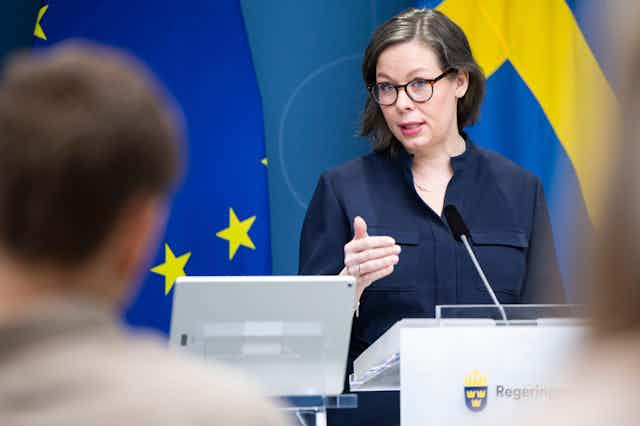Workers in the welfare sector are currently giving Sweden’s government a significant headache in a dispute about upholding professional ethics. They are opposing a planned law that would require them to “snitch” on undocumented migrants. And since the successful implementation of the law would require their cooperation, the policy has reached something of an impasse.
The political crisis centres on a proposal to force doctors, social workers, dentists, teachers and other welfare professionals to report undocumented patients, clients and students to the police. This is a demand many professionals, their unions and even employer associations argue is fundamentally antithetical to professional ethics and obligations to care for and serve all.
Experts in the fields of human rights and labour law have questioned the legality and reasoning behind the law, some comparing it to the kind of peer-surveillance that characterised the Soviet Union. Some doctors, teachers and social workers have pledged to resist and break the law if it is introduced. And, recently, thousands of peoplegathered in Stockholm and Gothenburg to protest on the matter.
The proposal was introduced last year as part of the so-called Tidö agreement, a document outlining the basis of cooperation between the government parties – liberals, conservatives, Christian democrats and the radical right-wing Sweden democrats. While the agreement covers several policy areas, migration and border control take centre stage. Four goals are outlined, aiming to bring about a “paradigm change” in asylum, immigration and integration policies.
The goals outlined in the agreement are similar to the British Home Office’s hostile environment policy introduced a decade ago. This consisted of a number of administrative and legislative measures designed to encourage or force people without residency permits to leave the country of their own accord. They might, for example, find it impossible to rent accommodation or register with a doctor.
In a recent speech in parliament, prime minister Ulf Kristersson promised that Sweden’s intake of refugees will be kept at an “EU minimum”, implying the nation will meet its obligations but do no more than absolutely necessary. Last year, he claimed that immigration and “failed integration” of migrants are key drivers of Sweden’s economic and social problems.
The Tidö agreement reflects this narrative and promises to introduce a “requirement-based” integration policy, as opposed to a rights-based policy. Migrants will face tougher demands to learn Swedish and secure employment, but there may also be language testing for small children and aptitude tests to establish which migrants can remain in the country based on how well they have behaved.
Migrants living in “exposed communities” – a term referring to areas characterised by “low socio-economic status” where “criminals impact local communities” – could expect to receive house calls from the authorities and to be stopped and searched on the street.
Pushing back
In December last year, two months after the Tidö agreement was made public, more than 4,000 healthcare workers signed a petition against it. They argued that its proposals were racist and antidemocratic. They were especially critical of the plan to take in fewer refugees as part of the UNHCR resettlement programme and of the suggestion to detain asylum seekers for longer periods. The stop-and-search policies were a particular concern from a human rights perspective.
But it is the Tidö agreement proposal to force public sector workers to report undocumented migrants that has caused the strongest outcry. The proposal, which is currently being drafted into law by a government-appointed committee, was quickly dubbed “the snitch law” and protesters were soon seen wielding placards stating that care workers and teachers are just that. They are not border police.

One explanation for why the proposal has provoked such a strong response among welfare professionals is that it affects close to 1 million workers. They belong to professions whose ethical principles are in direct opposition to the idea of creating further hardships for those served.
For a long time, Swedish agencies and professional associations have defined best practice as never mixing border patrolling and care. This was affirmed in 2018, when a court decided that it was fair to terminate a dental hygienist’s employment after he had reported undocumented migrants to the migration agency.
One labour lawyer concluded that the applicable principle is to consider reporting (or snitching) unreasonable. Making it an obligation would represent a sea change in the expectations on professional behaviour.
Yet this is precisely what the Tidö agreement demands of Swedish teachers, nurses, therapists and social workers – a sea change in behaviour. Questions have been asked about what will happen if they refuse. If a teacher doesn’t report a student, will the headteacher be forced to report the teacher? And if the headteacher refuses to report the teacher, will the headteacher be reported and sentenced?
The protests call attention to public sector workers’ professional identities and ethics, and the political potential enshrined in those positions. The government is being called out for wanting care workers and teachers to abandon established and cherished codes of conduct and it is unclear what will happen if they continue to refuse.
One option would be an embarrassing climbdown on the policy. But these measures are a priority for the Sweden Democrats, so another option would be to pull the plug on the Tidö agreement. That could bring the government down altogether.

